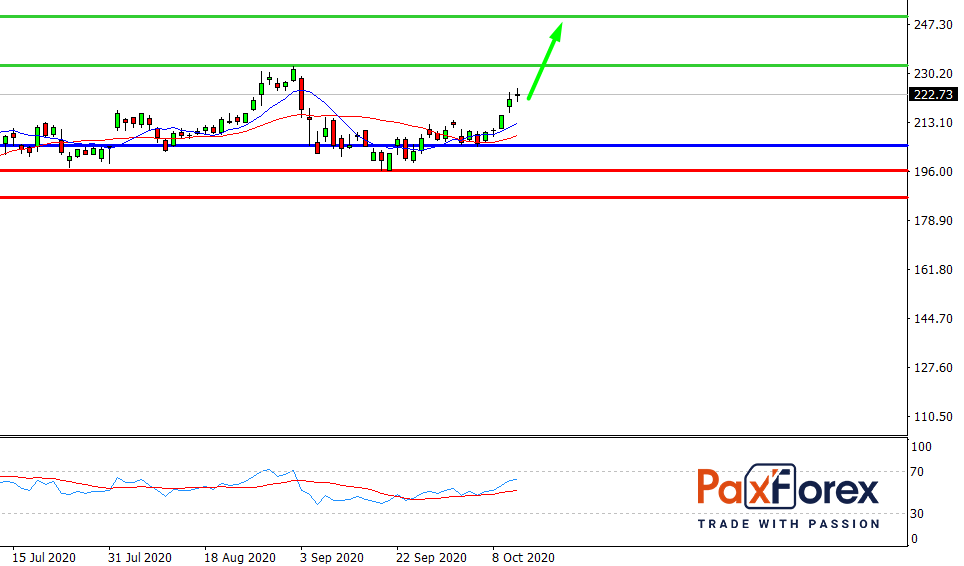
Source: PaxForex Premium Analytics Portal, Fundamental Insight
Microsoft shares over the past five years have delivered an overall return of more than 400%, thanks to a strategy to focus more on the mobile and cloud, developed by CEO Satya Nadella. Under the leadership of Nadella, who became CEO in 2014, Microsoft has expanded its cloud services, integrated them into Windows 10, launched new mobile applications on iOS and Android, introduced new devices Surface, and increased its gaming ecosystem Xbox.
These efforts have turned Microsoft, which was often ignored as a mature technology company, into an impressively growing asset. Over the past 12 months, the company has also grown by more than 50% due to the end of the trade war, COVID-19, and other macro situations. Investors may not want to buy Microsoft shares at this time, but some believe that shares could still grow by the end of the year. There are four simple reasons for this:
- Revenues from commercial cloud
Microsoft's revenue from the "commercial cloud" has grown by 36% to more than $ 50 billion, which is more than a third of its top line, in fiscal 2020 (which ended June 30). The business unit includes Office 365, cloud-based versions of its performance software, CRM (Customer Relationship Management) platform Dynamics, and the cloud infrastructure platform Azure.
Azure, which has grown year on year by an average of nearly 60 percent over the past four quarters, is the segment's main growth engine. Microsoft does not disclose accurate revenue figures for Azure, but Canalys estimates that it controlled 20 percent of the cloud infrastructure market in the second quarter of 2020, placing it second behind Amazon Web Services, which accounts for 31 percent.
Azure may still have enough room to work for three reasons. First, companies that compete with Amazon, especially retailers, are likely to use Azure instead of fueling Amazon's most profitable business. Second, Microsoft recently outsourced Amazon to the Pentagon for a $10 billion JEDI (Joint Enterprise Defense Infrastructure) contract to upgrade its cloud infrastructure, which is likely to attract other government contracts.
Finally, the wider cloud infrastructure market will continue to expand as people use more and more cloud services, applications, and streaming services. According to Grand View Research, the global cloud computing market may continue to grow with an average annual growth rate of 14.9% between 2020 and 2027.
- Xbox Series S and X Release
Next month Microsoft will release the next generation of Xbox game consoles, the X Series, and the S Series. The X Series will cost $500, while the cheaper, less powerful, and completely digital S Series will cost $300.
The Sony PS5 will cost the same as Series X, while the all-digital PS5 Digital Edition (which has the same hardware as its older brother) will cost $400. Microsoft Series S will be less powerful than PS5 Digital Edition, but the difference of $100 can defeat ordinary gamers.
Microsoft also recently acquired ZeniMax, which owns cult franchises such as Doom, Fallout, Wolfenstein, and The Elder Scrolls, for $7.5 billion to strengthen its gaming division and counteract Sony's exclusive games. Microsoft already ships ZeniMax games bundled with an Xbox Game Pass subscription (which offers unlimited downloads from its library of more than 100 games), Xbox Live, and Project xCloud with a new "Xbox Game Pass Ultimate" subscription plan for $15 per month.
If these aggressive efforts bear fruit, Microsoft's gaming business, which last year increased its revenue by 2 percent to $11.6 billion and reached 8 percent of the top line, could again become a major growth engine in fiscal 2021.
- The PC market is still strong enough
According to Canalys, global PC shipments in the third quarter increased by 13 percent compared to the third quarter of last year and were the highest in the industry for the past ten years. This growth was largely driven by the shift to remote work and online education during the quarantine.
The growth in PC sales will contribute to Microsoft's Windows business, which last year accounted for 16 percent of sales, as well as the office and other products business, which accounted for 25 percent of sales. The growth of these two main business lines, along with the strengths of the cloud and gaming computing segments, should offset the impact of the pandemic on enterprise-centric business.
- The company's high valuation is justified
Wall Street expects Microsoft earnings to grow by 12% this year. This is a stable growth rate, but some investors may shudder at a forward P/E ratio of 33. This estimate is not cheap, and a forward dividend yield of 1% does not offer much protection from falling.
Nevertheless, it should be remembered that Microsoft's resilience throughout the pandemic, the continued growth of its commercial cloud business, and the upcoming tailwinds in the gaming industry all justify such a small premium. In short, investors who accumulate stocks today can expect a decent return next year.

Provided that the asset is traded above 205.00, follow the recommendations below:
- Time frame: D1
- Recommendation: long position
- Entry point: 223.02
- Take Profit 1: 232.90
- Take Profit 2: 250.00
Alternative scenario:
In case of breakdown of the level 205.00, follow the recommendations below:
- Time frame: D1
- Recommendation: short position
- Entry point: 205.00
- Take Profit 1: 196.30
- Take Profit 2: 187.00













